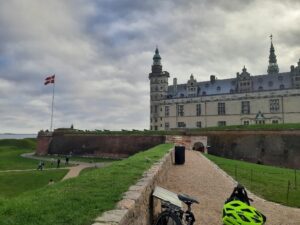Kategorie: ‘Host Country’
Working in a hosptial in Saint-Pierre – La Réunion
- Medicine
- France, St. Pierre
- Centre hospitalier universitaire la Reunion
- 03/2023 – 07/2023
Application:
I applied about a year in advance through the e-mail address etudiants-medecine@chu-reunion.fr. The application required a CV, a letter of motivation and the certificate of matriculation. Compared to Martinique and Guadeloupe, you get a pretty reliable answer when applying for la Réunion. At first, I only received a confirmation that the application had arrived, and even with more inquiries, I did not receive the final acceptance until the beginning of December. Therefore, perseverance and patience are required. However, the lady in charge, answered all my questions very quickly and reliably. After the acceptance, I still had to send some documents such as a copy of my passport, liability insurance and vaccination certificates. Overall, I found the application process somewhat lengthy but uncomplicated.

© Jana Mattes
Accommodation and living costs
I started looking about 1-2 months in advance. The French and also the Reunionese are still very active on Facebook, which is why I joined various Facebook groups (just enter Colocation Saint-Pierre/ Coloc Réunion or similar on Facebook). Furthermore I searched on Airbnb and leboncoin. Leboncoin is more or less the French Ebay. In the end, I found a small one-bedroom apartment near the central bus station on leboncoin. I also bought a bicycle through leboncoin, which I also highly recommend for the way to the hospital, as traffic is really annoying on the island. The apartment was quite expensive (800 euros/month) and since I got to know two other German students over time, I moved in with both of them after two months. Here it is worth asking around in the hospital if there are doctors who travel for a while and unrent their house. We were lucky and lived the last two months in a large house with a pool 5 minutes walk from the hospital (400 euros/person).
Also, if you want to do something on the weekends, it is worth renting a car. Five of us shared a car for 450 euros a month. There are buses, but these often do not go to the starting points of the hikes and you are much more flexible with the car.
Otherwise, I have found the cost of living is not much more expensive than in Europe. You can get fresh fruit and vegetables very cheaply at the weekly market and free lunch at the hospital.
The internship
My workday began at 8 a.m. in the visceral surgery department. At first, no one really felt responsible for me. A nurse got me work clothes and then I went along on rounds. The rounds were generally kept very short and there was no teaching. After that, I was always sent to the operating room. Since there was only one resident at the time I was there, I was often the first resident in the operating room. Here, questions were always answered nicely and the atmosphere in surgery was very relaxed and less hierarchical compared to Germany. Once or twice I was also allowed to help with suturing, but in Reunion, unlike in Germany, this is often done by the senior physicians themselves.
At noon, I almost always had lunch with the other erasmus-students and since the doctors work relatively long every day (until 18/19h) and do not send you home, I went home at some point usually around 3 or 4 pm.
After 6 weeks in the visceral surgery I changed the department, because I also wanted to see other departments. This was possible without any problems. I then spent 2 weeks in the emergency room. Here I was able to work very independently, examining patients, suturing and writing reports.
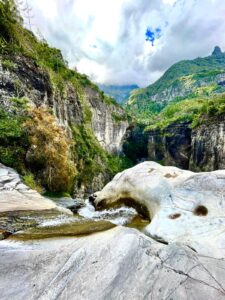
© Jana Mattes
The last weeks I was in the orthopedics department together with 3 other erasmus students. Here I often switched between the outpatient clinic and the operating room, the doctors here were really nice and the medical standard was quite high.
Overall, you have to have a high level of personal commitment and show a lot of initiative to learn something, but if they notice that you are interested, it is quite possible to learn a lot. You can also arrange the working hours as you like. The doctors are overall very relaxed and nice, but they don’t really know what to do with foreign students. In addition, they don’t pay much attention to possible language barriers, which is why I only recommend an internship there if you speak a sufficiently high level of french.
Free time
Reunion is an really beautiful island in terms of leisure! For anyone who loves hiking, climbing, nature and outdoor activities, the island will be a paradise. We spent most weekends backpacking and camping in the mountains. Must-dos are of course the volcano, Piton de Neige and Mafate. During the week, we often went to the beach bar on the small beach of Terre Sainte in the evenings. On Sunday evenings there are always free live concerts in Saint Leu, which are worth a visit.

© Jana Mattes
There are always many new people on the island who only stay for 1-2 years, so it is quite easy to meet new people. Also in the hospital we were a group of one Spanish, three Germans and three Swiss. French students were few, because in la Réunion you have to continue studying on the mainland after the 6th semester.
Overall, of course, it was very hot and humid in the first months (March, April), then it cools down considerably in the winter.
Summary
Overall, I can recommend a stay on la Réunion to anyone who likes nature and mountains. The landscape there is simply insanely diverse and beautiful. In the hospital you have to be very proactive and stay quite long in the evening if you want to learn something. Otherwise, you can be very flexible with your working time and also take a day off if you want.
Clinical rotation in the department of surgery in Bruneck, Italy
- Medicine
- Bruneck, Italy
- Università di Verona
- 03/2023 – 07/2023
1. Application/Finding an internhip
The preparation for my hospital internship in surgery was very smooth. I applied 7 months
before my stay at various hospitals throughout South Tyrol. I was able to find an internship for
the entire 4 months in Bruneck. Although everything worked out well I would recommend
applying earlier to be on the safe side. There was a dedicated contact person, Dr. Neumair, at
the hospital in Bruneck who handled communication with the University of Verona. She
ensured that everything was arranged for my stay. Working with her was extremely helpful and
reassuring, as it allowed me to focus on the professional aspects of my internship without
worrying about organizational matters. The International Office was also very helpful with my
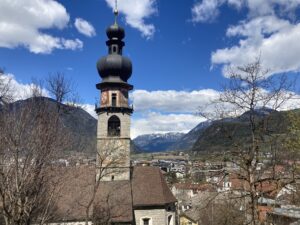
Bruneck
© Felicitas Weiß
Erasmus Plus application, providing clear guidance and prompt communication with the
respective contact persons. Their support made the process stress-free, enabling a rewarding
international academic experience during my hospital internship.
2. Accomodation & Living expenses
After a quick research on the internet (http://accommodationunibz.blogspot.it/) I was able to stay in a 5-person shared
apartment with other students from the University of Bozen. For 520€ per month I got a fully
furnished 17sqm room. The shared apartment had great common areas with a pool table and
Netflix account. There was also a laundry room and a cleaning lady who came every two weeks.
The accommodation was perfect and allowed me to have a pleasant stay during my internship.
There were also some cheaper rooms for subletting, but I preferred to live in a shared apartment
so I could connect with people who live in Bruneck and know the area.
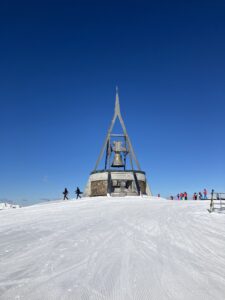
Kronplatz
© Felicitas Weiß
The cost of living in South Tyrol is comparable to Germany. Groceries are a bit more expensive.
However, public transportation is quite cheap and reliable. Most importantly, aperitivos are
cheaper than in Germany and are usually served with a small snack on the side!
3. The internship
My surgery rotation was an enriching and rewarding experience. Working in the general surgery
department provided a wide range of opportunities, from assisting in the operating room to
helping out in the outpatient clinic and the emergency department, known as “pronto soccorso”.
Everyone in the team was genuinely kind and welcoming, always ready to answer questions
and eager to receive assistance.
The hands-on experience was good. I was given the chance to examine patients, perform
ultrasound scans, and even practice suturing. The surgeons made me feel like a valued member
of the team. During quieter times in general surgery, I was encouraged to observe and assist the
orthopedic team.
The hospital staff must speak both Italian and German, so it is easy to communicate with them.
There are only a few patients who speak only Italian or Ladin. In these cases, the nurses
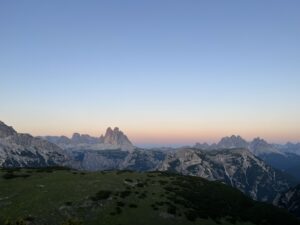
Zinnen-Blick
© Felicitas Weiß
translate, and after a while I picked up the common expressions and was able to use them
myself. If you are not from southern Germany, the South Tyrolean dialect can also be a bit
difficult at first, but you understand it with time.
My day started at 7:45 am and I usually stayed until 2:30 pm. Sometimes I could leave earlier
or had to stay longer to assist in the operating room, depending on what surgeries were coming
up. Besides me, there were five other students in general surgery and trauma surgery, so we set
up a rotation schedule so we didn’t have to come in every day or could leave early. Our schedule
also included weekend duty (on-call shifts). In return, we got two days off during the week.
A definite highlight was the cafeteria’s delicious meals. As students, we enjoyed complimentary
access to a variety of Primi Piatti, Secondi Piatti, a salad buffet, and delicious desserts.
4. Free time/tips
During my free time, I took an Italian language course at a language school to improve my
communication with patients. The course proved to be very helpful during my hospital
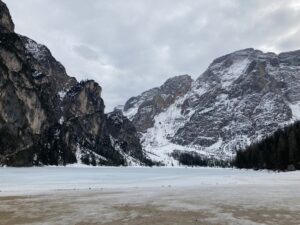
Pragser Wildsee
© Felicitas Weiß
internship and especially my travels afterwards and I would recommend doing one if you have
the chance.
When I arrived in March, the ski season was still in full swing, and with the Kronplatz as the
local mountain in Bruneck, it provided the perfect conditions for skiing. The snow-covered
slopes and breathtaking panorama made for unforgettable ski days. It was an excellent
opportunity to experience the beauty of the South Tyrolean mountains.
Later, I used my free time for extensive hikes to explore the nature of South Tyrol. The
surrounding landscapes offered a variety of hiking trails, lakes and summits. I strongly
recommend doing Piz da Peres and Peitlerkofel as well as a sunrise/sunset hike at Sambock.
In addition to exploring the local region, I embarked on exciting trips to some of Italy’s famous
cities. Venice, with its romantic canals and unique architecture, Verona with its impressive
Colosseum, and the fashion capital Milan were just a few of the captivating destinations. I also
visited Turin, Genova, Meran and the Garda Lake, each providing a different cultural diversity
and an immersive experience in the Italian way of life. It’s easy to reach those cities by train
and if you book in advance the tickets were very cheap.
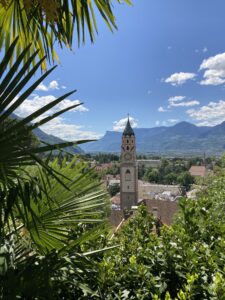
Meran
© Felicitas Weiß
The time spent with my roommates and my colleagues was also a highlight of my leisure
activities. We enjoyed the relaxed atmosphere of the aperitivo bars, went on great hikes, or even
paragliding together.
Overall, my leisure time during the internship was a perfect balance of active outdoor activities,
cultural explorations, and enjoyable camaraderie. The diverse opportunities the region offered
made this period an unforgettable and enriching experience during my time in the surgical
department.
5. Conclusion
In conclusion, my hospital internship in the surgery department was an incredibly enriching and
unforgettable experience. From the smooth preparation and comfortable accommodation to the
hands-on learning opportunities and supportive team, every aspect of the internship exceeded
my expectations. Additionally, exploring the beautiful landscapes, immersing myself in the
Italian language and culture, and forming lasting friendships with my colleagues made this
journey even more special. I am grateful for the knowledge and skills gained, and I will carry
the memories of this remarkable experience with me throughout my medical career.
Wonderful time in Vienna
- Medicine
- Austria, Vienna
- Universität Wien
- 03/2023 – 07/2023
1. Application/Internship search
My journey began 2 years ago, when I considered doing a tertial of my practical year abroad. I had already done an internship in gynaecology in Vorarlberg and really liked the system and the friendliness. Vienna was also not completely unknown to me from visits and so I decided to go to Vienna. Also, because it was a perfect fit with German as the national language and the hospital system is of a similar standard to Germany. So, I was able to find my way around quickly in my first few weeks and had no problems with a language barrier.
Now, it should be noted that you should plan early if you decide to go to Vienna. Places are in high demand and, with around 600 students a year from MedUni alo
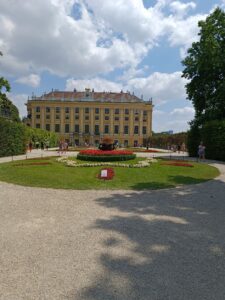
Schönbrunn Palace
© Lea Victoria Eckstein
ne, they are quickly filled. So, I started looking for a suitable hospital with the help of an online website and the PJ list of my state examination office. Ideally, it should already be recognised and a teaching hospital of the University of Vienna. That’s how I found the Franziskusspital Margareten, the former Hartmannspital. Maybe not outstanding in terms of size, but with its very own charm. I applied for a place in surgery, as this was one of the compulsory tertials in our PJ and relatively easy to complete abroad. I received positive feedback and was really looking forward to my time in Vienna.
The waiting time seemed long. Especially because the last information and documents were only sent shortly before the start. Not to mention that there were still problems with the recognition, because the “Landesprüfungsamt” requires a separate document for foreign tertials, which the University of Vienna does not sign. Instead, they issued a different document, which fortunately was recognised after a few exchanges of emails from the university PJ coordinators. Now, hopefully, nothing stood in the way of my stay, and I thought about suitable accommodation, travel health insurance and my financial situation. Since the practical year is generally not very well paid, I looked for options. I found an online article about the possibility of applying for an Erasmus+ scholarship, which was to be awarded specifically for internships. So, I tried my luck, and it took quite a bit of written arrangements, various emails and 2 application processes, but it was worth it. In January, 2 months before my stay abroad, I received feedback that my internship would be funded by the Erasmus+ programme of my university and that the University of Vienna also accepted my application within this framework and enrolled me as a temporary student.
This meant that I could register as a student in Vienna and received benefits such as the semester ticket, which allowed me to use public transport at very low cost from February to June. I was in contact with the International Office, which was very friendly and helpful. In Vienna itself, I made an appointment to clarify the final formalities. Beforehand, the entire application process and the document transfer took place via an online portal. This was uncomplicated and accompanied me until the end of the internship.
2. Accommodation & cost of living
Now the search for accommodation began, which I started relatively late, as a previously arranged accommodation through friends was not available in the end. In retrospect, this turned out to be fortunate. Just over a month before my trip, I started looking for a suitable room in a shared flat for the limited period. I simply used “wggesucht.de”. At first, it seemed quite difficult. There were a few ads, but only rarely did anyone respond to the request. But I was lucky, and a flat-sharing community contacted me. It was in the 3rd district and my job was in the 5th district. I could walk to work in half an hour or even faster by bus or tram. This seemed perfect and I was happy when I got an acceptance letter. Moreover, the price for the 10m^2 room with bunk bed was only 316€. It must be said that there is a much larger proportion of social housing in Vienna, which the city has subsidised and where the rents have remained cheap. That means you could get a bargain or two. However, the “normal” prices of the shared rooms tended to be much higher, around 500-600€.
On top of my rent, I had to pay my own monthly costs for various insurances, mobile phone tariffs and Spotify, as well as my old-age provision. That added up to quite a lot every month (about 280€).
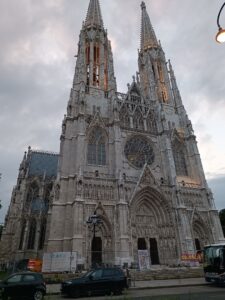
Votiv Church
© Lea Victoria Eckstein
And of course, there’s food, which is already more expensive here in Austria than in Germany. Inflation has made it even more expensive, but it was still a bit of a shock for me when I went shopping at Hofer/Aldi and spent about €50 on a normal weekly shopping trip instead of €25 (before inflation, admittedly). So, I spent about 200-250€ a month on food. All in all, I spent about 900€ a month. Then there were the leisure activities, and especially the months when visitors came, the monthly expenses were already over 1000€. All in all, Vienna is average, I would say, if you can find cheap accommodation. But the leisure activities can increase the expenses quite a bit, depending on how much you want to indulge yourself and how much you can. I also had a loan as a backup that I could fall back on. That’s something everyone must decide for themselves. Even though I would have liked to do without it altogether, I also needed the security to bridge the intermediate phases of the tertials.
3. Everyday life/internship
In March 2023, I started my journey with the DB to Vienna, whereby I planned some lead time for the bureaucratic things. I planned the registration with the city about 2 weeks before the trip and reserved an appointment. The same went for the International Office. That way, I was able to work through everything smoothly during my first few days in Vienna. I received a warm welcome from my shared flat and was able to settle into my room and explore the area very quickly.As my internship, I typically started my workday at 7am with the morning meeting. This meant I had to get up at just before 6 to get ready and get going on time. My way to work took me past Belvedere Palace, through long house canyons and across a playground to my hospital, which is integrated in the middle of a house block. There I was assigned my respective task in the morning. At the beginning, this consisted mainly of assisting in the operating theatre. But since the team was small overall, I was able to be a 1st assistant very often and learned how to sew in my time. I usually worked alone with a senior doctor at the table or also with a 2nd assistant. Otherwise, I worked on the ward and made admissions, went on rounds, helped the residents, and talked to the patients after the operation. On days when I didn’t have a fixed schedule, I was also able to go to endoscopy or special outpatient departments. Despite the small surgery, the spectrum was relatively broad because of the many affiliated doctors who came to the hospital to operate. There were orthopaedic, neurosurgical, and ophthalmic surgeries, for example, in which we worked rather subordinately. But there were also mamma operations and thyroid operations in addition to general surgery. So, I gained a relatively broad insight into surgery. Even though, of course, major operations and trauma
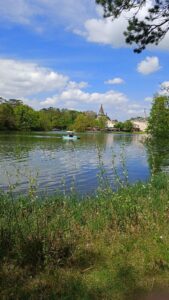
Laxenburg Castle
© Lea Victoria Eckstein
surgery were missing. However, this was made up for by the atmosphere. For me, the official end was at 1 pm plus a half-hour lunch break and 1 hour of self-study. Here in Austria, an hour of self-study is part of the working day for students. However, there were also days when I stayed longer in the operating theatre to help with an operation or to take some pictures on the ward. Afterwards, I went straight to the city or back home.
The team was very nice overall. I was integrated immediately and got my own phone, a locker and someone was always ready to explain things or let me try things out myself. In the operating theatre, the staff were very courteous and the atmosphere during the operations was relaxed to humorous, depending on the day. You could go to all the senior doctors at any time and especially to the head medical secretary in charge, who always had an open ear and with whom you could also talk about wishes for days off or holidays without any problems.
4. Free time/tips
In addition to work, there was also plenty of free time, and sightseeing was not neglected. Vienna is simply a beautiful city. Everywhere you look you see house facades with stucco or ornaments. The city simply has its very own flair. The big buildings like Sissi’s Hofburg, Schönbrunn Palace or St. Stephan’s are the most typical tourist destinations. But through my longer time in Vienna, the beautiful parks also won my attention. When winter gave way to spring, everything started to blossom and for such a big city, Vienna really has a lot of beautiful green spaces and parks all over the place. Even from my flat you had a view of a smaller park from the balcony. However, my personal highlight during my time was the Danube Island. I was particularly taken with it, because it is simply a very long island in the middle of the Danube surrounded by water and yet the big city. A piece of dysentery in the middle of the stress. It can even be reached by underground line U1 and is especially popular at weekends for cyclists, hikers, walkers, families, and students. It offers small restaurants, paved paths, access to the Danube for swimming, volleyball courts and barbecue areas. And of course, there is a lot of meadow and sunbathing areas where, in good weather, the most diverse groups spread out on blankets, but also individuals who just want to enjoy the sun. During my stay, the annual Danube Island Festival also took place where I could hear Felix Jaehn and Silbermond live. Apart from that, Vienna is just incredibly diverse. There is so much gastronomy and especially coffee houses, which are very popular and where you can eat typical Viennese specialities. The famous “Sachertorte” at Café Sacher or an Esterhazy slice at Gerstner’s? I recommend the Sacher cake at the “Hofzuckerbäckerei Demel”. It’s a little more tart and chocolaty to my taste. But everyone has their own taste:)
As for entertainment, there is so much to choose from that I often couldn’t decide what exactly I wanted to see. The many museums, but especially the theatre performances/the ballet/the musicals/the operas really appealed to me. With the Ticket Gretchen app, I was able to register as U27 and benefited from many offers and incredibly cheap tickets. For example, I was able to book a ticket for the Burgtheater and the Volksoper for €10-12 on certain dates in every seating category. I sat in the balcony with a direct view of the stage for a Shakespeare play or in the second row in front of the orchestra pit for a musical. Concerts in St. Stephan’s Basilica or dance evenings could also be attended at low cost.
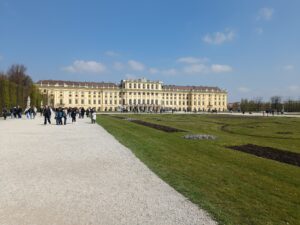
Schönbrunn Palace
© Lea Victoria Eckstein
As soon as I had visitors, I always went either to the State Opera, the Volksoper or to some other event. I wanted to experience most of the cultural offer. And it was worth it and can be recommended for anyone who is U27.
In May, the Vienna Festival Weeks started, with fairs, festivals and wine/beer festivals lined up on the weekends. There was not a weekend without a programme. And in some cases, admission was completely free, and you could just stroll through and enjoy.
5. Conclusion
Overall, I had an incredibly wonderful time in Vienna. And I would do it again every time. Both the work was fun, but also the city won me over. Seeing how summer comes to Vienna, how the parks become greener, how you can explore nature and the hiking trails in the surrounding area and still be able to enjoy the advantages of a big city with all its culinary and cultural offerings was a dream that I was able to fulfil. Thanks to the Erasmus funding, among other things, I was able to enjoy a few things without having to turn over every euro. I am very grateful for that.
Internship in Milan
- Governance of Technology and Innovation, MA
- Italy, Milan
- Politecnico di Milano
- 04/2023 – 06/2023
Application/Finding an internship
The search and application for the internship was relatively easy for me. Both RWTH Aachen University (RWTH) and Politecnico di Milano (PoliMi) are partners within the IDEA League network, which supports research stays at collaborating universities. The first prerequisite was to find a researcher who could supervise me during my stay. I had previously met my supervisor in person at an IDEA League Summer School. The fact that we already knew each other personally made it much easier for me to get in touch. He warmly welcomed the idea. It was more difficult when I subsequently contacted the host institution for my endeavor. At first, I received a rejection saying that PoliMi, the School of Design respectively, would not accept any interns or visiting scholars on a master’s level. After contacting the IDEA League representative of RWTH, who immediately got in touch with PoliMi, my research stay was eventually approved. First, I applied for the IDEA League Research Grant, but I got rejected. However, this didn’t affect the approval of my research stay. I was then advised to apply for funding through Erasmus+. I was pleasantly surprised by how quick and easy it was to apply for an Erasmus+ traineeship. In the end, my application was accepted, and I was thankfully awarded the Erasmus+ grant. Initially, I applied for two months, but I quickly realized that I would like to extend my stay by another month. This went smoothly and very uncomplicated. So, if plans change, even at short notice, it is possible to adjust them via Erasmus+. I would advise everyone to start very early with the application. I started 6 months in advance, but you underestimate how long an application process, in my case even two, can take.
Accomodation & Living Expenses
The search for suitable accommodation in Milan confronted me with great challenges. First, I searched for flats and shared apartments on popular websites like idealista. My relatively short stay of only a few months as well as my arrival in the middle of the semester made the apartment search even more difficult. After a long search, I found a shared flat via spotahome, a website for short and medium-term stays. I would only consider portals like spotahome or dovevivo if nothing else can be found, as bookings always come with additional fees and costs. The housing market in Milan is complicated. It is very difficult to find anything and certainly not at prices that are reasonable for students. There are reasons why numerous students are protesting these conditions by living in tents on campus. Therefore, it is not uncommon to share rooms in Italy. Although I was initially put off by the thought of almost completely giving up privacy, I ultimately decided to share a room as well. It was far less bad than I thought, but of course it depends a lot on who you get as roommates. And you usually don’t know that when you book a room through websites like spotahome. Not only the cost of housing, but also the cost of living is quite high in Milan, even by German standards. Milan is one of the most expensive cities in Italy and you should be aware of that. Not only restaurant visits, but even the cost of weekly grocery shopping is quite high. Usually, somewhat higher than in most major German cities. In retrospect, I am glad I saved on rent so I could at least live relatively comfortably without getting into financial trouble.
Everyday life/ the internship
I enjoyed the research stay very much. PoliMi is a prestigious institution, the facilities are remarkable, my research group called META was small but full of interesting and nice people who welcomed me warmly and supported me in all my needs. My workplace was on the Bovisa campus, just outside the city center. The campus is home to design students of all kinds. It is colorful, flashy, and bursting with creative people. It was a pleasure for me to come to the campus daily. As I came to PoliMi as a visiting scholar, the internship was not an internship in the traditional sense. As a visiting scholar, you are more independent and usually conduct your own research, but you are allowed to use the facilities and infrastructure on site, for example in the form of office spaces or the library. Since my master’s thesis is coming up, I was able to do a lot of research and collect data here. I also benefited from being able to collaborate and exchange ideas with researchers from similar fields. I assisted my colleagues by working together on projects and events. Hardly any day was like another, which made my stay even more varied and interesting.
Free time/tips
As far as everyday life is concerned, Milan has an incredible amount to offer. You can find everything your heart desires. Whether cultural institutions, sports, music events, restaurants, or festivals. Milan is a vibrant city. Moreover, Milan is very well connected within Italy. Therefore, it is easy to get pretty much everywhere from Milan. I took advantage of this and can highly recommend everyone to do the same. Italy is a beautiful country rich in culture and history. Additionally, Italy has hands down the best cuisine. There is certainly something for everyone.
The first tip is to get your Codice Fiscale early on. The Codice Fiscale is a tax identification number, but it is used for all kinds of contracts. Since I was not going to earn any money in Italy, I thought I would not need it. I was wrong though. I needed it for the rental contract and for a three-month card for public transport in Milan. The Codice Fiscale can be applied for at the Italian embassy in the state where you have your registered residence. The process may take several months. Another tip is to seek an exchange student status. I was offered the status as part of my application, but I declined because I did not think it was necessary. It was not mandatory, but the status would have given me access to the Erasmus student network, which would have allowed me to participate in numerous field trips, events, and parties. Obtaining exchange student status through the IDEA League is also relatively straightforward. If I had known this beforehand, it would have made it much easier for me to connect with exchange students. The third tip is to learn basic Italian. This becomes especially clear the further south you go in Italy. In the university context, English is not a problem at all, and it is also understood in many parts of Milan. In everyday life, however, it often comes in handy to have at least a rudimentary knowledge of Italian. Although Italians are warm and open to people from abroad, in my experience they are delighted if you at least try to speak the local language. My final tip is discounted tickets to cultural institutions. If you are an EU citizen and under the age of 25, you can get tickets at many cultural institutions at greatly reduced rates. Whether it’s the Last Supper in Milan, the Uffizi in Florence or the Museo die Capodimento in Naples. With an entrance fee of 2 euros, you don’t have to think twice about going to visit them.
Conclusion
All in all, I am very satisfied with my stay. It was different from what I expected, but I enjoyed it a lot. I met great people, was able to broaden my horizon and experience the Italian way of living. PoliMi is an excellent institution, and I was honored to spend a few months there. Moreover, Milan has much more to offer than just fashion. It is a vibrant big city with lots of possibilities. Looking back, I would do a few things differently. I would apply for an exchange student status and would start looking for housing earlier. In hindsight, however, one is always smarter. That is why I am happy to share my experiences so you can learn from my mistakes and get even more out of your stay in Milan. Nevertheless, I had a great time and would choose to stay at PoliMi anytime.
My master thesis in Denmark
- Molecular and Applied Biotechnology, M.Sc.
- Denmark, Greater Copenhagen
- Technical University of Denmark

The Shakespeare caste in Helsingør, a nice destination for a day trip on the bike.
© Rebekka Horstmann - 10/2022 – 05/2023
To complete my master’s in biotechnology I was looking for a master’s thesis abroad and the Novo Nordisk Foundation Center for Biosustainability (CfB) at the Technical University of Denmark came to my attention. Denmark is well known for its thriving biotech sector and the center convinces with a strong focus on delivering more sustainable solutions for our society.
Finding accommodation in Greater Copenhagen can be challenging since not only the rent but also the deposits and prepaid rents can be a deterrent. However, student housing is in part also applicable for master thesis students at the accommodation office of DTU. While renting a studio apartment in a dorm is not necessarily the cheapest option, it makes flat hunting easier. Another common practicality is to have the moving-out date a couple of days, for example 10 working days, before the end of the lease, which is good to keep in mind.
During my stay at CfB, I was seated in an office with other master’s students, PhD students, research assistants, and a fermentation engineer which was a great chance to get very diverse input to the questions and challenges that came up along the way. In general, I experienced fairly flat hierarchies, and the openly designed workspace allowed for a lot of fruitful scientific discussions. As mandatory for an external thesis, I found examiners in Aachen before I started my project and had supervisors at the external institution. I was lucky to experience very supportive and thoughtful supervision which allowed me to develop a broad skill set. Fortunately, a Symposium was hosted at DTU on my last day, giving me the chance to present my findings on a poster and to get additional input.
Since DTU is a campus university, a lot of activities are offered in very close proximity. Therefore, it is easy to meet some other people during sports causes even with a full experimental schedule. Another part of the Danish work culture is the concept of “Friday bars”. In my center, the Friday bar was held once a month and was basically everyone gathering with a beer or soda in the canteen during the afternoon. That created a very relaxing atmosphere and gave a lot of opportunities to get to know your colleagues besides work topics as well as people from other research groups.
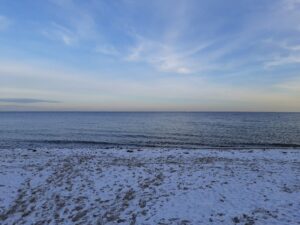
Skodsborg beach during the ice bathing season.
© Rebekka Horstmann
While written Danish is maybe not impossible to understand as a German-speaking person, spoken Danish can be quite tough. However, once you are registered in the civil registration system (and have a CPR number), the Danish government offers language courses in exchange for a deposit only. These courses are a great opportunity to meet other international students from different disciplines, have fun in practicing all the sounds in the Danish language, and of course, learn some basic Danish.
Regarding free time activities I can highly recommend to either bring or rent a bike. All across Zealand, there is a quite good network of bike lanes which is perfect to take a day trip to one of the many castles such as the so-called Shakespeare castle in Helsingør. It is also very convenient to explore the inner city of Copenhagen by bike and in most cases, you can even take it on public transport for free. As soon as the temperatures drop, you can see a lot of Danes going for an ice bath at one of the beaches which I can highly recommend giving a try.
My Research Internship at the NTNU Trondheim
- Psychology B.Sc.
- Norway, Trondheim
- Norges Teknisk-Naturvitenskapelige Universitet
- 01/2023 – 05/2023
Preparation
My path to the Research Internship at the Institute of Psychology at NTNU was surprisingly
easy. I met the head of the institute at NTNU during a guest lecture and wrote him an email
after his lecture asking about the possibility of an internship. 5 minutes later I had my

Northern lights on the way to Tromsø
© Selina Fußwinkel
acceptance and could choose my starting time flexibly. So I can at least give you a tip for an
internship at this institute: Just ask! Internships are by no means typical here, but they are
easy to implement and welcome
Traveling to Norway and Housing
I quickly found someone via Facebook who was able to take me to Trondheim by car. Even
though the journey takes longer than by plane, I can only recommend it. Especially the part
through Norway itself is very scenic and gives you a first impression of the country.
In Trondheim itself, I didn’t stay in a student dorm like most people, but in a shared flat near
the city center (Buran). This turned out to be a very good decision for me. Some of the
student dorms are further out and the bus connections at night are not particularly good,
which is why the walking distance from the city to my shared flat was often very practical. It
also gave me contact with Norwegians, which is otherwise not so easy due to the ERASMUS
bubble. Finding a flat was also very easy. The website Hybel offers a really wide range of
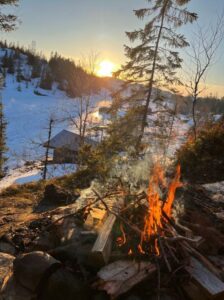
BBQ at the Mevasskoia Cabin
© Selina Fußwinkel
shared flats, which even write to you themselves. So if you prefer smaller and more personal
shared flats to student dorms, I can highly recommend it, even if it is of course a bit more
expensive. But I had a very good time with my two flatmates!
My Internship
I really enjoyed my research internship at the Institute of Psychology for the whole 5 months.
However, you have to show a lot of initiative. There are a lot of researchers working on
different projects at the institute, which were presented to me at the beginning. However, I
was completely free to decide where I wanted to work. On the one hand, this meant that I
could devote myself to the projects that I found most exciting in terms of content, but on the
other hand, it also meant that I first had to get an overview, write lots of emails and ask
where it was possible to work. So it took 1-2 weeks until I could really get started and find my
projects and tasks. After that, however, the whole thing became a no-brainer and I always
had something to do. The work itself was a lot of fun. I mainly did literature research,
analyzed data sets and co-wrote papers. If you do a good job, you’re even accepted as a co-author.
In general, I was given a lot of trust and I had a lot of freedom in my work and little
control, also meaning that if you need help, you have to communicate that directly as well. I
found this working environment and the atmosphere perfect. I was very warmly received by
the team and we had lunch together every day. I especially enjoyed the contact with the PhD
students. In summary: Super nice team, exciting content, lots of initiative needed!
I was absolutely thrilled with the university itself! There are numerous cafés, beautifully
designed study rooms and libraries (especially the library in the old building on the
Gløshaugen campus), bookstores, small supermarkets and very good (but also very
expensive) food in the canteen. Especially important: Every Wednesday is Cinnamon-Bun
Wednesday, which means cinnamon buns are available in every university café for a small
price. I haven’t missed a single one!
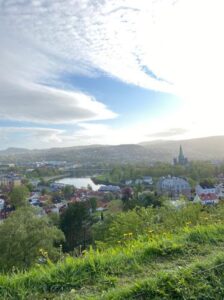
Trondheim in Summer – View von the Fortress
© Selina Fußwinkel
Daily Life in Trondheim
Trondheim is a rather manageable, small city, but very student-oriented. It didn’t take me
long to feel at home here and settle in. For students in particular, the heart of the city is the
Samfundet student house. It is run by students on a voluntary basis. Here you can find bars, a
restaurant and a café, several clubs and event rooms. You can go here every day and there is
always something going on. Parties at the weekend, concerts during the week, pub quizzes,
discussion evenings and my personal highlight: Wine-Wednesday. Apart from the student
house, however, the party life in Trondheim is rather lukewarm. If you like techno, you should
follow the Technophilia events on Facebook, as these are the only good techno parties here.
Otherwise, the bar “Circus” is highly recommended, where the music is rockier. For the
typical party nights, head to Fire Fine or Heidi’s Bierbar. In my opinion, that’s it for the
selection of good party options, so we often organized our own home parties.
Besides parties, Trondheim has a lot more to offer. The landscape with its location directly on
the fjord is beautiful. When the weather was good, we discovered barbecuing for ourselves,
either in the city by the river, at the meadows near the fortress or at Korsvika Beach. At least
once a week we went to the sauna. A particularly individual sauna can be found directly on
the coast, the Bunker Sauna. You have to heat it up yourself, though. There is also Havet.
Here you have to go at least once for the morning rave at 7 a.m., preferably on the first
Wednesday of the month, when you also get breakfast.
I also did a lot of sports here. The sports on offer are super varied and very cheap. For 120€,
you can go to the university gyms for the whole semester, attend classes here and try out all
the courses at NTNUI.
Trondheim has a lot to offer in terms of cuisine, although it is of course relatively expensive. I
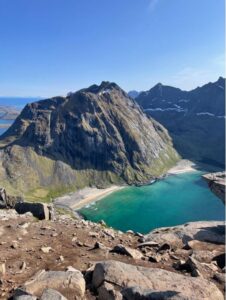
Lofoten Trip
© Selina Fußwinkel
can highly recommend the ramen restaurant “Koie”, the Olavshallen (here you can order
from 5 restaurants at once) and the pizza buffet in the Tyholt tower. It’s worth going here
anyway for the perfect view of Trondheim.
In and around Trondheim you can go hiking and skiing in winter. The Bymarka area is only
half an hour away. Here you can both hike and ski and stop at the Grønlia hut, which is
located right by the lake and offers a large selection of homemade cakes. It is also worth
taking a trip to Estenstadhytta and the Theisendammen viewpoint. The app Komoot also
offers some good routes in and around Trondheim.
As far as the weather is concerned, you really should be prepared for anything at any time in
Trondheim. The weather can change between sun, snow and rain a thousand times a day.
Sometimes you don’t see a single ray of sunshine for weeks, then suddenly it’s gloriously
summery. The darkness in winter worried me quite a lot at the beginning, because I usually
find winter in Germany terrible. And of course, it’s extremely dark and cold at the beginning,
but since everything is still very new at that time and so much is happening, there’s still no
time for tiredness and the time until it stays light a little longer passes super fast. I loved the
days when the sun didn’t set at all. The sleep rhythm gets absolutely out of balance, but
sitting in the park or on the beach at 3 a.m. in daylight is a very strange but very cool
experience.
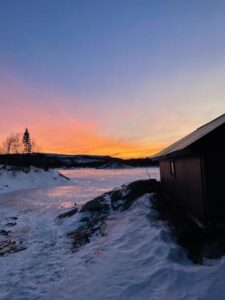
Sunset at the Heinfjordstua
© Selina Fußwinkel
Excursions and Trips
One of my personal highlights: Our cabin trips. The university owns some cabins closer and
further away from Trondheim. You can stay here very cheaply and spend great weekends. We
went on a total of 3 of these trips. The cabins are sometimes in more or less good condition,
so you shouldn’t expect luxury, but you are always directly in nature and can hike to and from
the cabins. I can really recommend going to the newly built cabin called Mevasskoia on the
other side of the fjord
We also went on a road trip to Tromsø relatively early after our arrival in February. Also, one
of my highlights. I can only recommend everyone to do this trip by car and not by plane. The
road was scenically spectacular and a unique experience. We saw the northern lights on our
first day at our first stop, and then again on the following days. We also encountered some
moose on our way. We saw a lot of the country on this trip and got to know the winter in
Norway so far north in a completely different way.
In general, I would recommend everyone to take time to travel after the end of the semester.
Great destinations are the Lofoten Islands, the numerous national parks, Ålesund, Bergen
and possibly side trips to Sweden and Denmark on the way back.
Writing my Master’s thesis in Paris
- Business Administration and Engineering: Mechanical Engineering M.Sc.
- France, Paris
- Neoen SA
- 10/2022 – 03/2023
I had the opportunity to write my external Master’s thesis at Neoen in Paris and had a very positive experience. I generally recommend gaining experience in a company, whether in your home country or abroad, just before the end of your studies, as it helped you better understand the sector and learn a lot. Neoen SA is a French company that operates in the renewable energy sector and was founded in 2008. The company is involved in the development, construction, and operation of wind, solar, and energy storage projects and is headquartered in Paris. With over 6 GW of renewable energy projects worldwide and a strong focus on sustainability and innovation, Neoen is a key player in the renewable energy sector.
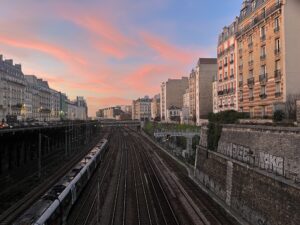
© Marie-Sophie Braun
It was much easier than I expected to find a PhD-student willing to be my responsible party from university side to supervise the thesis. None-the-less it remains a lot of extra work in terms of organization and also identification of a topic that will meet all the needs. Also, you do have to acknowledge that at some points, you will have to help out with non-thesis related tasks at the company: It will be a strong learning opportunity, but requires a lot of self-organization, especially in a foreign country.
The experience of living in France was particularly emotional for me because of a close connection to France from my childhood and family bounds. I thoroughly enjoyed the purely French environment and appreciated being able to speak the language in a work context. I do emphasize that a solid language level is a prerequisite for most of the French work environments. Even if the official language in companies could be English, I guess you could be the odd-one-out if you are the only person in the company not speaking the countries language and while it would be a problem for work-related topics, it might be difficult for a chat at the coffee machine.
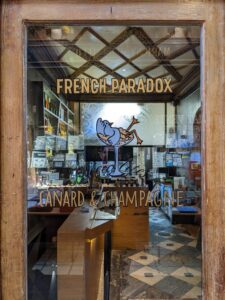
© Marie-Sophie Braun
The parisian work environment is very chic and neat. Jeans or sneaker were not seen. Guys weren’t allowed to wear polo’s at work and this will go without saying. Good clothing and good food are important in France in gereneral, I assume: This includes long breaks for lunch and an additional espresso after the meal. Even though, people are very chic, everyone was very friendly and open-minded.
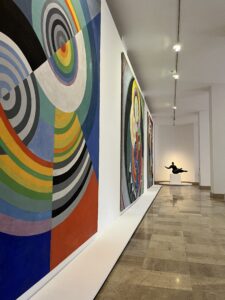
© Marie-Sophie Braun
I lived in Batignolles, in the 17th arrondissement and fell in love with the part of the city. It is a very nice, safe and friendly neigboorhood. Additionnally, I was able to get everywhere quickly by bike, which is the best means of transportation in Paris. I also recommend cultural centers (tiers lieux) and state museums, which are free for people under 26.The night life in Paris is very dense and differentiated. Depending on where you go it will be different. Less touristic parts of the city can be found for example in the 11th or 12th arrondissement and also, you should watch the sunset from the top of the parc de Belleville there. People more often meet outside then inside because appartments are small and the French terrasse-culture is very strong. In all seasons, you will find people outside and in a good mood.
In conclusion, I strongly recommend to anyone who speaks good French the opportunity to write their Master’s thesis in Paris. I had only had the best emotions. Although Paris is not a cheap city, I was able to pay the rent with the company’s expense allowance and overall had a very positive experience.
Medical internship in Lyon
- Medicine
- France, Lyon
- Université Claude Bernard Lyon 1 – Hôpital Edouard Herriot
- 10/2022 – 02/2023
Preparation:
Around 6 – 7 months in advance I started applying at university hospitals in France that had a partnership with my university in Aachen. As soon as I got the approval for a 4-month-internship at the University Claude Bernard Lyon 1 I applied for the Erasmus + traineeship programme with the support of the international office at my hometown university. Within a few weeks everything was set and I only had to take care of the needed insurances for the internship and started looking for accomodation in Lyon.
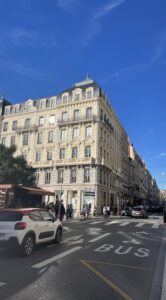
© Semiha Apaydin
Accomodation:
First of, housing in Lyon can be very frustrating. For my part I ended up doing a sort of flat-hopping. I had already heard a lot about the difficulties of finding housing in Lyon. Since I had a student status I could apply for student housing offered by the Crous but ended up not getting a spot. Therefore, I tried several months ahead to find a room in a shared flat on websites (lacartedescolocs.fr, leboncoin.fr) that people recommended in blogs. In the end I decided to text people who posted into Facebook groups about sub-letting their rooms for 1-2 months and finally ended up living in three differents apartments during my four months. This might sound very exhausting but it actually made my stay and experience very special as I got to live with different people in different parts of the city and made a lot of friends in an unique way.
Transportation:
To go to my internship and almost everywhere else in the city by metro (or bus) I had a public transport card from TCL which costs 25 Euros/month for students. Additionally, I subscribed to Velo’v bikes which were really useful when staying out late or just having an afternoon stroll along the river. Bike stops can be found everywhere in and around the city and the subscription costs 15 Euros/year.
Daily life:
As one of the biggest French cities, Lyon has a lot to offer without being too big or chaotic. Everything can be reached with the metro in less than 30 minutes and there are always events around the city. Especially if you are interested in going to museums, the cinema or the theatre, I can highly recommend the Carte Culturel for about 18 Euros which offers free or at least discounted entry fees.
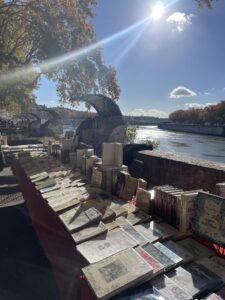
© Semiha Apaydin
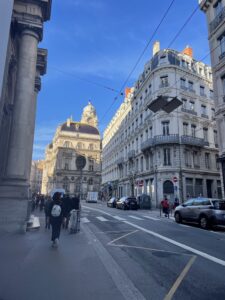
© Semiha Apaydin
On warm days everyone is meeting up at one of the two rivers or in the Parc de la Tête d’Or which was also one of my favourite spots in the city. A common thing to do after work or just with friends are Apéros which are usually just a little get-together in a bar for example. It is mostly before dinner and includes drinks and snacks.
Every day life including grocery shopping, going out for drinks or a restaurant were generally a more expensive than in Aachen. Concerning payments I always paid with my German Debit or Visa Card and barely needed cash. Also, I kept using my German mobile phone number and contract.
Additionally, it is very easy to travel around Lyon as Paris, Annecy, Nice and a lot of other pretty cities are easy to reach by train or BlaBlaCar (long-distance carpooling application) which is very popular in France.
Internship:
During my first six weeks I was in Internal Medicine. As we were only two externs (students are called externs at the hospital while residents are called interns) there was a lot to do for us. I mostly covered administrative tasks including phone calls and and preparing patient files but was also responsible for being the first one who examines newly administered patients on the unite. In the beginning I was a bit overwhelmed especially when having to do phone calls. On the other side, this helped me a lot to understand the language and speak freely in a short amount of time.
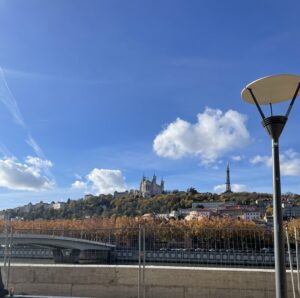
© Semiha Apaydin
I spent the followoing six weeks in Digestive Surgery. This internship was rather observatory. The interns explained a lot but I did not feel like being a great help to them as there were almost no tasks for us students. Every thursaday, the department organised a teaching session with the students and one of the doctors. Each week two students had to present a patient’s case which was then discussed.
During my last six weeks I was assigned to the department of Dermatology. Dermatology at HEH consisted mainly of accompanying a residents for the planned or emergency consultations. Every student was assigned to resident. One of my tasks was to carry out skin biopsies, this way I additinally got to work on my suturing skills.
Conclusion:
Even though I struggled a lot finding an apartment in the beginning, everything else was so easy going and made me love my stay in Lyon a lot. Lyon offers everything one could search for especially regarding cultural activities while yet not being over-crowded. Especially with it’s two rivers paired with the French enthusiasm to go out, especially after work, the city has an inviting charme that inspires for deceleration.
Internship in London
- Architecture M.Sc.
- United Kingdom, London
- Outpost
- 03/2022 – 03/2023
The following notes are a collection of my experience and recommendations of my Erasmus year in London. I’ve put them in categories to make it a bit easier to potentially find answers to your questions. I’ve tried to keep it relatively broad so it’s not all about architecture and rather a guide to navigating a year in London. More so what to expect to happen in the background rather than specific locations or events. This focuses a bit more on students going abroad and specifically to London as interns rather than students. I suspect the experience will greatly differ depending on whether or not you do your Erasmus exchange as a student or as an intern. Things like accommodation, social life and money are probably where things will differ the most, as students can apply for student housing which will be cheaper than the general housing market (obviously there will be exceptions). Furthermore you will probably have a social circle from the get go, as there will be similar minded people in your courses or even other international students. Lastly you’ll probably not earn any money as a student. Depending on your visa (obviously subject to change) you might not be allowed to work, which can make living in London a little harder.
I really hope you can gain something from this list and that the numbers won’t scare you away from going. The great thing about a big city like London is that there’s always a way to make ends meet.
Architecture internship
- Finding a studio in London can be made slightly easier by following an architectural photographer on instagram as a photographer usually has a wide range
of studios to choose from showcasing their best and most recent works - I recommend calling people to show both initiative and how proficient you are in speaking English
- Studios are usually very busy so emails might get lost
- From experience I can confidently say that to going to a smaller practice will be way more beneficial in getting the right amount of one on one mentoring, more insights into multiple RIBA – stages and better opportunities to get to know your colleagues
- For my internship I applied to multiple studios with natural building materials as that wasn’t covered in my B.SC
“Salary”
- Be aware that the Erasmus grant won’t be enough to support you in London (Probably applies to the rest of the UK as well)
- Try to get a sense of what your potential employer will be paying you to determine how much additional funds you will need
- Aim for at least 700-800 £ as a modest room in zone 2 will cost about 600£ if you are lucky (London prices probably not applicable to the rest of the UK)
- If you’re planning on commuting to work via the tube account for roughly another £150 as travel in 2022 from zone 2→ 1 was 2,50 = 5£ a day
- A British bank account might also be worth considering as a European card might entail a lot fees (I recommend Monzo for this)
- Opening a bank account requires you to have an address. Your workplace address should suffice
Phone
- If you are struggling to get a decent internet connection l can recommend giffgaff as a provider
Accommodation
Important!
If you visit London as an intern and not a student you will find it difficult to find affordable accommodation as you can’t get into student housing!
- Living in zone 2/3 is definitely more than alright & also central enough! It will be a few hundred £ cheaper than zone 1 and offer the same lifestyle
- Be aware that travelling by tube everyday can add up and it might, again, be cheaper to pay more in rent than later on in tube fees as the season tickets are way to expensive
- From personal experience finding a flat can prove to be difficult. This was probably exaggerated by the fact that I arrived in London in early 2022, right after the pandemic, the war in Ukraine and the increase in energy prices resulting in a cost of living crisis in the UK, as well as a lot of migration in London as people were priced out of their current homes and in search for cheaper alternatives
- I would not recommend staying at a hotel for even a few weeks as even the cheap ones will drain your accounts. Try Airbnb to find a longer term solution to have a place to start searching from if you haven’t had the chance to do so before coming to London
- Airbnbs can be very costly as well so try looking in zone 3 if you’re staying in London. Your commute into central might only be 15 mins longer but you will save at least a few hundred pounds per month that way.
- For reference I had to spent almost all of my Erasmus grant in the first two months of staying in London just for accommodation
- Don’t be picky and take what you can get! You can always move later as renting culture in London is very different from Germanys and people are constantly moving. Usually the rooms are already furnished as people leave their stuff behind and don’t buy new furniture.
- Renting can require references from previous landlords. Sometimes it might be beneficial to ask your Airbnb landlord or your employers to offer their contact details as a reference if your future landlord wants to check if you can make your rent on time etc.
- In terms of utilities, be mindful that living in London means having to pay council tax! Depending on which borough, how many people live together and what employment status you have the tax can range from 30 to 150£ per month. ( As a student you are exempted from having to pay council tax, but if you are an intern you might have to pay and if you live with only students you have to pay the full tax that would usually be split with all the tenant that are not students)
Activities and getting to know people
- Starting an internship places you in an unusual situation as you normally work 9-5 which makes it a little harder meeting other people in your age group as they’re usually studying, meaning they probably have a different routine/rhythm
- I found that going to the gym for classes like yoga or boxing etc. can help meeting people after work organically
- Other activities like pottery is also a great way to get creative and meet people in the area
- An app I can recommend for meeting people in a new city is Meetup. Here you can search for different activities or interests and it will recommend events around you. Be careful though and don’t meet at a park at night or sth.
- Another App I can recommend is Dice, it shows you concerts and events in your area and it lets you buy tickets securely directly through the app
- Tuesdays is usually pub quiz night which means during the evening for a small fee people can form teams and try and find the answer to a couple of questions, another great way of meeting new people and usually the prize is a couple of free rounds of drinks


